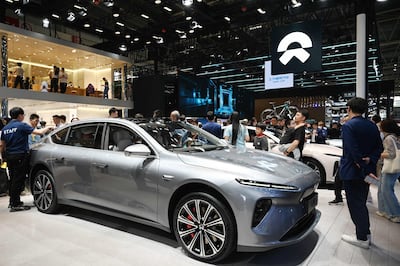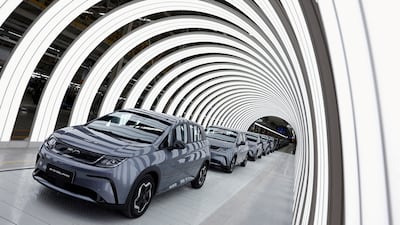Earlier this month, the EU began to enforce its tariffs on China for electric vehicle imports, yet the dated practice of taxing products aimed at creating fairer industry competition will probably have the exact opposite effect on Europeans.
On July 4, America celebrated Independence Day, marking the historic moment in 1776 when the 13 American colonies declared their independence from British rule.
In a twist of historical parallel, Europe marked this same date in 2024 with its own declaration of economic independence – specifically, independence from a flood of cheap Chinese EVs, achieved through the imposition of new and steep tariffs.
The EU-imposed levies on Chinese EV imports will vary across companies and can reach as high as 48 per cent for car makers deemed unco-operative with a recent EU probe.
Eric Mamer, a commission spokesman, described the higher duties as “a means to correct an imbalance”.
The case for tariffs
To be sure, the EU’s decision is driven by concerns about unfair subsidies that benefit Chinese EV makers. And these state hand outs are substantial, without doubt.
The Centre for Strategic and International Studies, a US think tank, estimates that from 2009 to 2021, the Chinese government ploughed more than $125 billion into the EV sector, making China’s industrial spending much higher than that of any other major global economy, the think tank said.
More pointedly, the European Commission’s investigation found that Chinese EV producers receive favourable terms, including preferential export insurance, tax exemptions and government-provided goods and services at below-market rates.
The EU concluded (albeit provisionally) on June 12 that the advantage of these subsidised imports could harm the European economy, leading to the imposition of higher tariffs on July 4.

Collective cost
Using tariffs is an old solution; everyone should know it is risky. European consumers will probably face higher EV prices immediately after the levies on Chinese imports. That limits consumer adoption and reduces choice in the EV market.
The bigger problem is that despite these tariffs, Chinese companies are expected to remain competitive due to their fundamentals. They have cheaper production costs, with or without government subsidies, compared with their European counterparts.
Such is the viewpoint of the financial market, which drove a 9 per cent surge in BYD’s shares – not the dip one might expect – after the EU tariff announcement.
Wall Street analysts and investors seem confident about BYD’s technological lead and manufacturing scale continuing.
Even within Europe, the view is not unified. Several European car makers oppose the tariffs, fearing potential trade retaliation. German Chancellor Olaf Scholz warned of those economic repercussions when he said that such measures “ultimately make everything more expensive and everyone poorer”.
But the problems do not stop there. The biggest risk is that the EU’s tariffs will push Chinese manufacturers to localise production in Europe, instead of just exporting vehicles to the 27-member bloc.
This strategic shift will ultimately create the kind of competitive advantages for China that the EU wants to avoid. Already, BYD this week agreed to build a $1 billion plant in Turkey, which is in a customs union with the EU.
As China’s economy slows, Chinese EV makers must find new markets. They are now forced to accelerate their global footprint by establishing manufacturing bases abroad. This mirrors the trajectory of Japanese and Korean car makers such as Toyota and Hyundai in response to US tariffs in the past. History repeats itself.
Already, Chinese car makers have started ploughing money into European factories – especially in Hungary, which maintains friendly relations with China.
The new EU tariffs will expedite this process of globalisation, inadvertently sharpening the competitive edge of Chinese car makers. The levies will backfire.
What will happen inside China? The country’s top-tier car makers such as BYD, SAIC or Geely will speed up the consolidation of their domestic market to strengthen their financial base, so they can invest even more aggressively in European manufacturing capabilities, for it is a costly and lengthy endeavour.
The result will be a total shakeout of China’s EV sector, reducing the number of manufacturers from more than 200 to about 10 big players by 2030, one can easily imagine, either through mergers and acquisitions or bankruptcies.
Many of these companies are already suffering from intense price competition and slowing sales due to a weakening domestic economy. Few are going to survive. But the big will become even stronger.
A win-win?
To avoid the gloom, Beijing and Brussels must re-evaluate their own strategy. Instead of erecting trade barriers, the EU needs to address the root causes of its declining competitiveness in the automotive sector in general.
The battle is not about tariffs but technological innovation for what is needed ahead. European car makers must excel in battery technology, software and chip design to compete on the global stage. And many do not right now.
Globally, the automotive industry’s future lies in software-driven vehicles, wireless networks and autonomous driving.
Short-term protection through tariffs will not save European giants such as Volkswagen or Mercedes in the long run. EU car companies should focus on the unique attributes that endear consumers to their brands and rethink the driving experience through advanced software features.
The automotive sector is crucial for the European economy, and its collapse would have catastrophic effects on the entire continent. That is what is at stake.
Fortunately, China will probably seek negotiations to avoid an outright trade war, given Washington’s hawkish stance towards China. Beijing knows it needs allies in western economies, not another enemy.
Technological partnerships and collaborative innovation with the EU could offer a more constructive path forward. If China leads in battery technology, why not encourage a sort of reverse technological transfer back to Europe?
If western companies lack the capital to build advanced plants, get Chinese companies to build factories on the continent and provide local jobs in Europe.
Since people have been complaining about forced technological transfer from the West to China, maybe it is high time for Europe to copy China’s playbook and reverse the situation?
And, as the EU’s levies are not set to become permanent until November, there remains a window for diplomatic solutions.
Brussels and Beijing must recognise the mutual benefits of co-operation over confrontation. For China, this means ensuring its export markets remain accessible while addressing legitimate concerns about its trade practices is crucial.
For the EU, the focus should be on enhancing its technological capabilities and maintaining open, competitive markets. Because ultimately, while aiming to protect domestic industries, the EV tariffs risk unintended consequences – including higher consumer prices and the unanticipated expansion of Chinese manufacturers abroad.
Howard Yu is the Lego® professor of management and innovation at IMD and heads IMD's Centre for Future Readiness.

